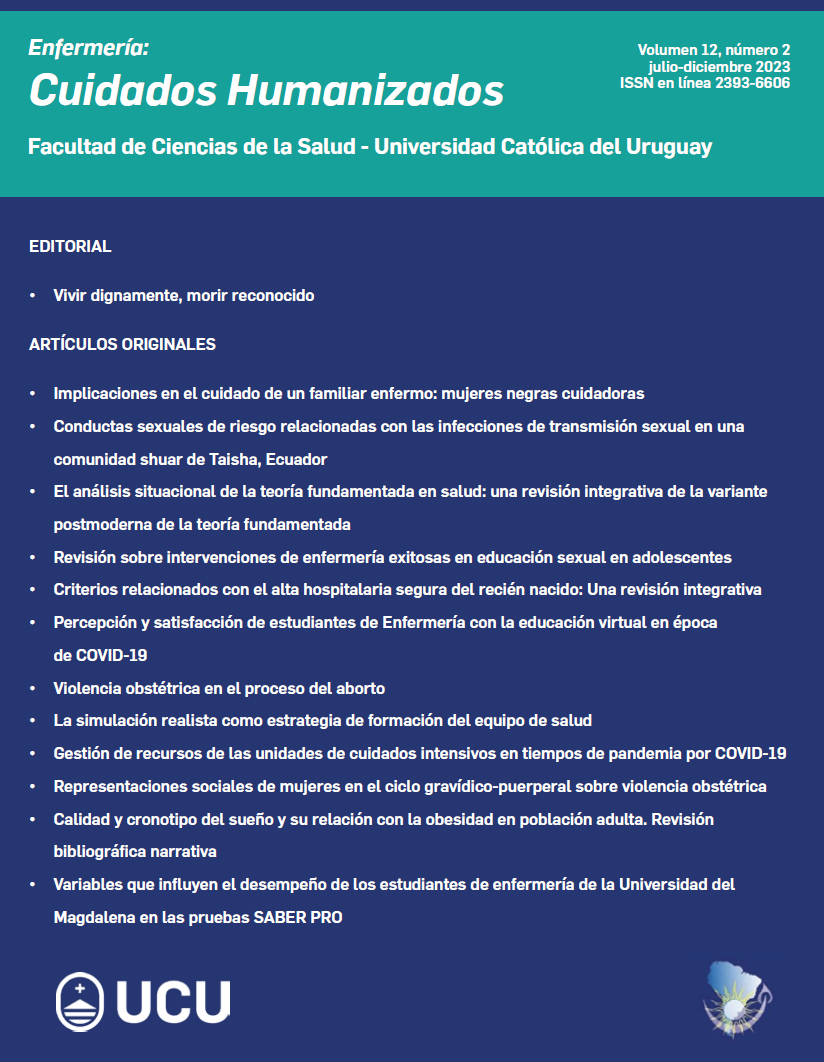Implications in caring for a sick family member: black women caregivers
DOI:
https://doi.org/10.22235/ech.v12i2.3131Keywords:
women, african americans, caregiversAbstract
Introduction: The disadvantages linked to the female gender are viewed in different aspects of life, through patriarchy. It is possible to understand that, in the case of black women, they are disadvantaged in the face of social structures, crossed by class, race and gender conditioning factors. In addition, it is seen that, in several cases, female caregivers, especially black women, do not voluntarily choose this role within the family environment. Objective: To identify the implications of care for a sick family member performed by black women caregivers considering their sociocultural conditions. Methodology: This work is an integrative review, whose search in the database was carried out in December 2020, where 3 results were found in the Web of Science database, 48 in the PubMed database and 29 in the LILACS database. After reading the abstracts of the 80 articles and applying the exclusion criteria, 7 articles were selected for full reading. Finally, 4 articles were included for analysis. Results: Only one study exclusively addressed women, and most were African Americans. Data indicate that, within a quilombola community, health care is passed on from the oldest to the youngest, as a symbol of respect for ancestral knowledge. In addition, it became evident that African-American caregivers of people with dementia need quality information about care and self-care, requiring resources in their community. Conclusion: It is possible to notice the inequalities according to the historical, political and cultural constructions caused, in order to differentiate men and women in family care. There is a need for debates that focus on the black population, especially caregivers, aiming at strategies to reduce their burden to care for sick family members.
Downloads
References
Coelho CT. Mulheres negras cuidadoras familiares: reflexões interseccionais para a enfermagem [Dissertação de Mestrado]. Pelotas: Universidade Federal de Pelotas; 2022.
Domingos SC. Posição desvantajosa das mulheres negras na divisão sexual do trabalho e nos cuidados domésticos no âmbito familiar. Revista Contraponto [Internet]. 2022 [cited 2022 oct 20];8(3):173-190. Disponível em: https://seer.ufrgs.br/index.php/contraponto/article/view/117669
Davis A. Mulheres, raça e classe. 1ª ed. São Paulo: Boitempo; 2016.
Collins PH. Aprendendo com a outsider within: a significação sociológica do pensamento feminista negro. Revista Sociedade e Estado. 2016;31(1):99-127. doi: 10.1590/S0102-69922016000100006
Kilomba G. Memórias da Plantação: episódios de racismo cotidiano. Editora Cobogó; 2019.
IPEA. Atlas da Violência 2013. Rio de Janeiro: IPEA-FBSP; 2013.
IPEA. Os desafios do passado no trabalho doméstico do século XXI: reflexões para o caso brasileiro a partir dos dados da PNAD contínua [Internet]. Rio de Janeiro: IPEA; 2019 [cited 2023 May 12]. Disponível em: https://repositorio.ipea.gov.br/bitstream/11058/9538/1/td_2528.pdf
Mendes KDS, Silveira RCCP, Galvão CM. Revisão integrativa: método de pesquisa para a incorporação de evidências na saúde e na enfermagem. Texto Contexto Enfermagem. 2008;17(4):758-764.
Casarin ST, Porto AR, Gabatz RIB, Bonow CA, Ribeiro JP, Mota MS. Tipos de revisão de literatura: considerações das editoras do Journal of Nursing and Health. Journal of nursing and health. 2020;10(5):e20104031.
Bardin L. Análise de conteúdo. São Paulo: Edições 70; 2017.
Sampaio RC, Sanchez CS, Marioto DJF, Araujo BCS, Herédia LHO, Paz FS, et al. Muita Bardin, pouca qualidade: uma avaliação sobre as análises de conteúdo qualitativas no Brasil. Revista Pesquisa Qualitativa. 2022;10(25):464-494.
Rozario PA, Menon N. An examination of the measurement adequacy of the CES-D among African American women family caregivers. Psychiatry Research. 2010;179(1):107-112.
Silveira CL, Budó MLD, Ressel LB, Oliveira SG, Simon BS. Apoio social como possibilidade de sobrevivência: percepção de cuidadores familiares em uma comunidade remanescente de quilombos. Ciência, Cuidado e Saúde. 2011;10(3):585-592.
Hansen BR, Hodgson NA, Gitlin LN. African-American caregivers’ perspectives on aggressive behaviors in dementia. Dementia (London). 2018;18(7-8):3036-305.
Abramsohn ME, Jerome J, Paradise K, Kostas T, Spacht WA, Lindau ST. Community resource referral needs among African American dementia caregivers in an urban community: a qualitative study. BMC Geriatrics. 2019;19(311):1-10.
Dourado DM, Rolim JA, Ahnerth NMS, Gonzaga NM, Batista EC. Ansiedade e depressão em cuidador familiar de pessoa com transtorno mental. Estudos Contemporâneos da Subjetividade. 2018;8(1). Disponível em: http://www.periodicoshumanas.uff.br/ecos/article/view/2377
Sampaio LS, Santana PS, Silva MV, Sampaio TSO, Reis LA. Qualidade de vida e depressão em cuidadores de idosos dependentes. Revista APS. 2018;21(1):112-121.
Cardoso CA, Noguez PT, Oliveira SG, Porto AR, Perboni JS, Farias TA. Rede de apoio e sustentação dos cuidadores familiares de pacientes em cuidados paliativos no domicílio. Revista Enferm. Foco. 2019;10(3):70-75.
Borghi CMSO, Oliveira RM, Sevalho G. Determinação ou determinantes sociais da saúde: texto e contexto na América Latina. Trabalho, Educação e Saúde. 2018;16(3):869-897. Disponível em: http://revista.cofen.gov.br/index.php/enfermagem/article/view/1792/579
Santos GSR dos, Paulino GB, Rocha FM, Luz RS da, Santos GVR dos, Dumas GB, et al. Política Pública, Saúde E Racismo: Revisão Integrativa Da Literatura. Práticas e Cuidado: Revista de Saúde Coletiva. 2022;3:e14537. Disponível em: https://homologacao.revistas.uneb.br/index.php/saudecoletiva/article/view/14537
Moron JG, Salomão JS. Representação Vs. Representatividade: Estudos Feministas No Brasil Na Pós-Graduação. Revista Conjuntura Global. 2022;11(1):41-60. doi: 10.5380/cg.v11i1.82573
Downloads
Published
How to Cite
Issue
Section
License
Copyright (c) 2023 Enfermería: Cuidados Humanizados

This work is licensed under a Creative Commons Attribution 4.0 International License.

















